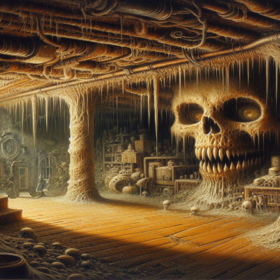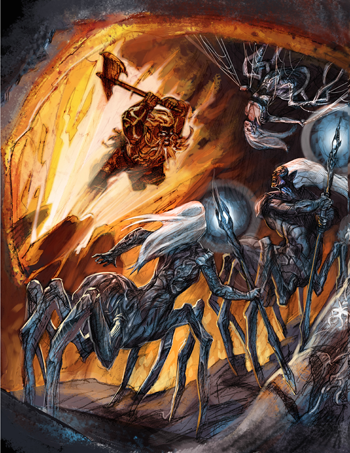13th Age, See Page XX
Build your own 13th Age battles
Download Ian’s 13th Age encounter manager here.
A lot of my time used in the preparation of 13th Age sessions is in the creation of encounters. Particularly in the specifics of balancing (or deliberate unbalancing) of encounters to a party’s level. 13th Age has a reasonably simple method for calculating an encounter’s level, but still I always find myself spending more time wrestling with maths than I do monsters. Time that could be better used creating meaningful encounters more closely tied to the story or spent pondering how I might make best use of the Owlbear’s ability to rip off limbs. This is what initially set me to work on creating a spreadsheet that would do all the fiddly, boring maths for me. What started as a quick time-saver focused on automating the application of the monster equivalents table spiralled quickly into how I might be able to make picking monsters based on their level and/or type easier, without having to flick between the various sources.
Whilst the encounter builder helps with preparation before hand, it is also helpful during sessions. Every adventuring group likes to wrong-foot their GM every now and again, and this is in part built into the more improvisational nature of 13th Age. Improvisation is something that I, as a GM, am still very much practising (with mixed results). Having a tool that will enable me to build an unexpected battle, because the PCs chased the The High Druid’s ranger instead of The Three’s assassin, is useful in giving me more confidence that I think ultimately makes for a better roleplaying experience for everyone.
Encounters are made to be run though. For PCs to fight (or avoid) the monsters you put in their path. It was only natural then that the encounter builder also allows encounters to be managed. The monsters are already there; why transcribe it to paper or to another document? The encounter manager pulls through all the monsters included in your encounter and also allows you to add player characters. So in the same way that I can focus on the fun parts of encounter building, the encounter manager helps me to focus more on the things that really matter in an encounter: the story, the tension, the ripping off of arms.
The manager automates, or at least provides prompts for the mechanics of the encounter. It can handle initiative, damage and hit points and it provides space for tracking conditions and on-going damage (something I often forget). This helps to speed up encounters and, everything else being right, makes for more exciting and tense battles.
As I rarely have the opportunity to roleplay in person these days, spending most sessions online with friends, using an encounter manager is natural for me. I have my session notes on one screen and my prepared (or not) encounters ready to open and do battle with my players. Those unpredictable forces for good (or not).




